
Proponents of intelligent design don't accept that some of the
Proponents of intelligent design don't accept that some of the very complex nanomachines that we have inside ourselves could have come about solely on the basis of natural selection.






“Proponents of intelligent design don’t accept that some of the very complex nanomachines that we have inside ourselves could have come about solely on the basis of natural selection.” Thus spoke Francis Collins, the scientist who journeyed from the structure of genes to the mystery of God, from the language of DNA to the language of faith. His words are not merely a statement of scientific discourse, but a reflection on the eternal dialogue between reason and wonder, between mechanism and meaning. In them, he captures the essence of a question that has echoed through the ages: How did we come to be? And perhaps more profoundly—why?
When Collins speaks of “complex nanomachines inside ourselves,” he invokes the intricate, almost miraculous architecture of life at its smallest scale. Within each human cell exists a world of movement and precision—molecular engines, protein machines, and delicate systems that sustain existence with an elegance that defies imagination. To many, these inner worlds suggest an intelligence behind their order—a design beyond mere chance. Yet to others, these same wonders are the inevitable outcomes of natural selection, the great sculptor of life, working patiently across the eons. Collins, as both a man of science and faith, does not ridicule either view. Instead, he acknowledges the tension: that where some see randomness, others see purpose; where some see evolution, others sense divine orchestration.
The origin of this idea lies in the long and sacred struggle to reconcile the human intellect with the human soul. In the 19th century, Charles Darwin forever altered humanity’s view of creation with his theory of evolution by natural selection. His insight explained how complexity could arise without design—how life could ascend from simplicity through the slow march of adaptation. Yet, even as his theory illuminated the pathways of biology, it left many hearts yearning for meaning. Was the universe truly blind in its workings? Could consciousness, morality, and love emerge from mere chance? Thus arose the modern tension: science as explanation, faith as revelation. Collins, standing at this crossroad, calls upon us to contemplate—not to choose sides, but to see how both may speak to the same truth from different tongues.
Consider the story of Johannes Kepler, the astronomer of the Renaissance who studied the heavens not to deny God, but to understand Him. When Kepler discovered that the planets moved not in perfect circles but in ellipses, many thought this imperfection challenged divine order. Yet Kepler famously said, “I am thinking God’s thoughts after Him.” To him, the laws of nature were not evidence against divinity, but the handwriting of intelligence woven into the cosmos. In the same spirit, Collins looks at the genome—the code of life—and calls it “the language of God.” The double helix, to him, is not a contradiction to faith but its fulfillment: a sacred text written in the alphabet of chemistry.
And yet, Collins’ words also speak a caution. The proponents of intelligent design, he says, do not accept that complexity can arise through natural processes alone. Here lies a challenge for both the scientist and the believer: to resist the temptation of certainty. For the scientist, there is the danger of dismissing mystery as ignorance; for the believer, the danger of mistaking mystery for proof. True wisdom lies between—the humility to know that understanding the mechanism does not erase the miracle. The cell, in all its precision, can be both the child of evolution and the whisper of creation. The sacred and the scientific are not enemies, but mirrors that reflect the same infinite light.
There is also a lesson here for all seekers of truth: that complexity itself is not the enemy of simplicity, but its partner. Life’s depth, its apparent contradiction, is what gives it meaning. Whether one calls it natural selection or divine intention, the emergence of life from lifeless matter is no less extraordinary. The more we learn of the cell’s machinery, the atom’s dance, the star’s birth—the more we are reminded of our own smallness and our own grandeur. For to perceive complexity is to glimpse the infinite, and to wonder at it is to awaken the soul.
Thus, the wisdom of Francis Collins speaks across the ages: do not fear knowledge, for it is not the opposite of faith—it is its expression. Study the cell, the gene, the star, not to prove or disprove divinity, but to stand in awe of the universe’s vast design, however it came to be. Let curiosity lead you to reverence, and reverence lead you to humility. Seek to understand, but never forget to wonder.
For in the end, the argument between intelligent design and natural selection is not a battle between opposites, but a conversation between two modes of seeing. One gazes through the microscope, the other through the heart—but both behold the same mystery. And if we listen with both mind and spirit, we may hear, as Collins has heard, that behind all mechanisms and all meaning there is a voice—not loud, not certain, but steady and eternal—whispering through every living thing: There is order here. There is beauty. There is purpose.






AAdministratorAdministrator
Welcome, honored guests. Please leave a comment, we will respond soon